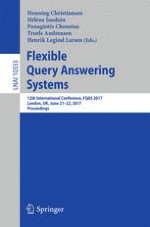
2017 | OriginalPaper | Buchkapitel
Abductive Question-Answer System (\(\mathsf {AQAS}\)) for Classical Propositional Logic
verfasst von : Szymon Chlebowski, Andrzej Gajda
Erschienen in: Flexible Query Answering Systems
Aktivieren Sie unsere intelligente Suche, um passende Fachinhalte oder Patente zu finden.
Wählen Sie Textabschnitte aus um mit Künstlicher Intelligenz passenden Patente zu finden. powered by
Markieren Sie Textabschnitte, um KI-gestützt weitere passende Inhalte zu finden. powered by